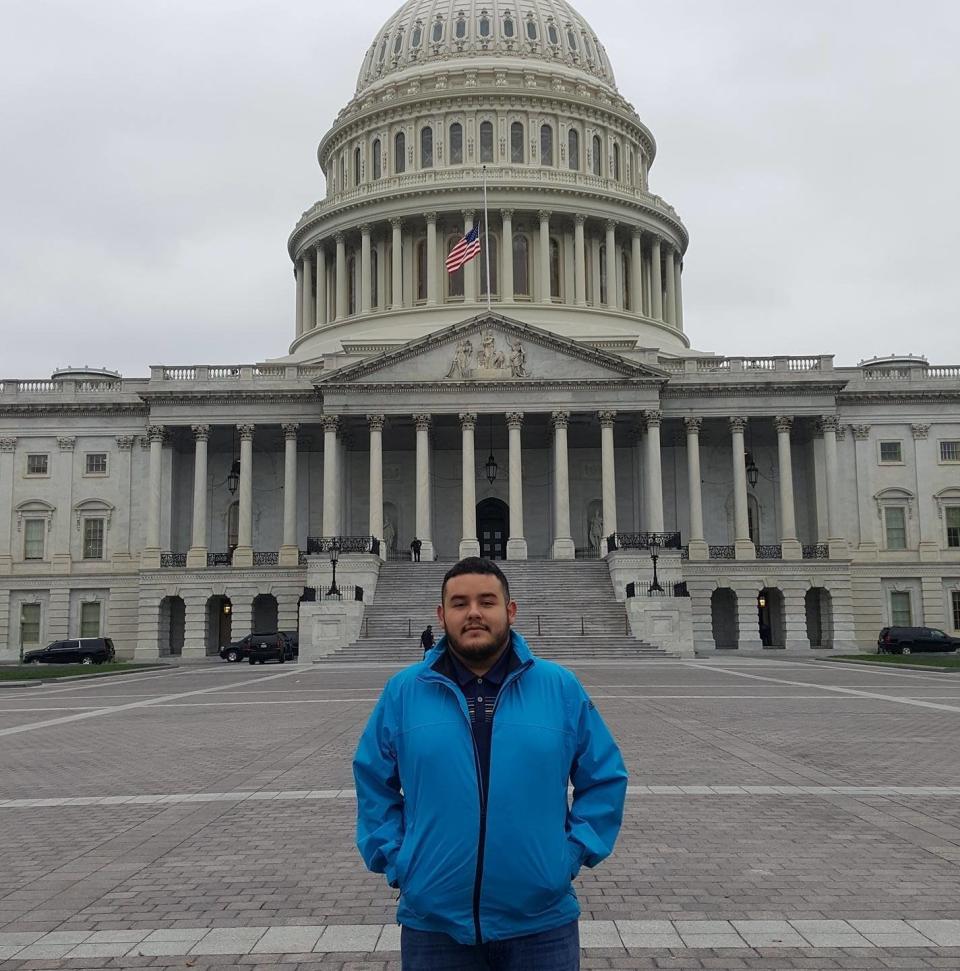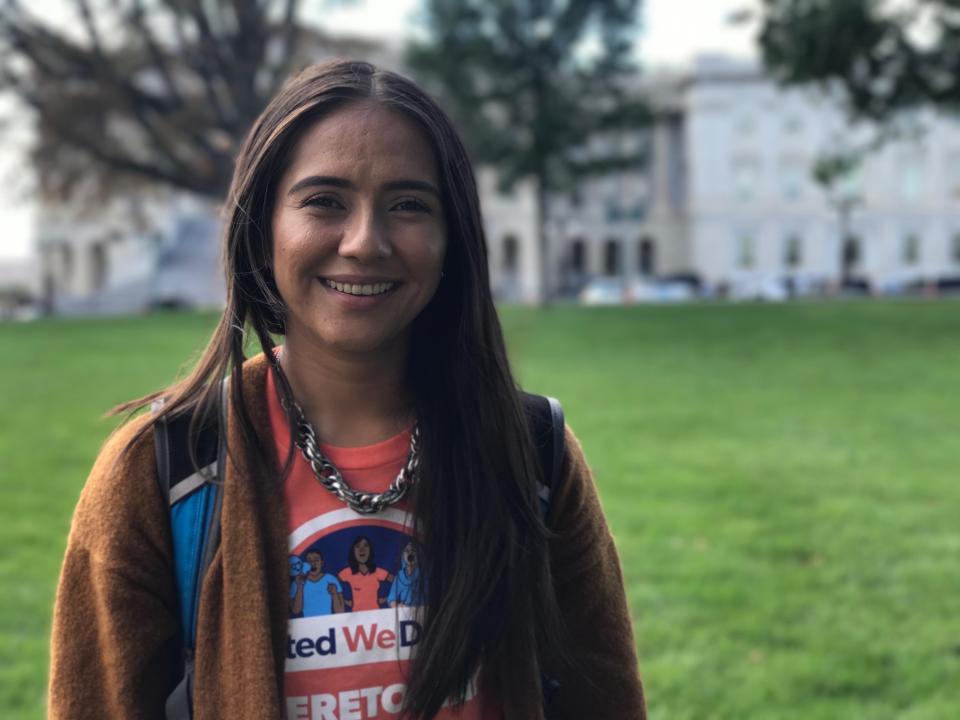Republican Leaders Say Helping Dreamers Isn't An Emergency. For Many Dreamers, It Is.
WASHINGTON ― For Republican leaders in Congress, finding a legislative solution to help young undocumented immigrants who may soon be deported isn’t an urgent problem. They figure they have a few more months before they need to do anything.
“There is no crisis,” Senate Majority Leader Mitch McConnell (R-Ky.) said Sunday on ABC’s “This Week.” He added later, “There’s no emergency. The president has given us to March to address it.”
“The deadline is March, as far as I understand it,” House Speaker Paul Ryan (R-Wis.) said Thursday at a press conference. “We’ve got other deadlines in front of that, like fiscal year deadlines and appropriation deadlines.”
But for Juan Navarro, 25, it is an emergency, and the deadline is well before March. He is set to lose deportation protections under the Deferred Action for Childhood Arrivals program within weeks, potentially forcing him out of his job, his health insurance and his graduate school studies.
Navarro is one of thousands of so-called Dreamers, or young undocumented immigrants who came to the United States as children, who could soon be ― or have already been ― affected by President Donald Trump’s decision to rescind the DACA program and years of Republican opposition in Congress to bills that would grant them legal status. Trump, Ryan and McConnell insist they have until March to act because the president’s decision allowed DACA recipients whose status was set to expire before then to apply for renewal of the two-year protections.
They imply it won’t make a difference whether they do something now ― as Democrats and some Republicans have demanded ― or later. But in the meantime, Dreamers are already losing status. Some, like Navarro, are waiting for renewal applications that might not come through in time. Others were eligible to apply to renew their status but didn’t get a $495 fee and application in to the government in the four weeks they were given. While Congress delays, an estimated 122 DACA recipients per day lose their status, according to the left-leaning Center for American Progress.
Waiting is doing damage to Dreamers’ lives, Navarro said.
“Congress just doesn’t realize the impact this is continuing to have, the mental damage that it’s causing, the anxiety that it’s causing within the community,” he said.

Navarro has lived in Oregon since he was three years old, when his parents brought him to the U.S. from Mexico for medical treatment for cerebral palsy, which left him unable to walk. They stayed in the country as he underwent surgeries and physical therapy. Navarro walked without assistance for the first time when he was 15.
He applied for and received DACA for the first time in 2012, granting him a two-year work permit and making him eligible for in-state tuition. That allowed Navarro to finish a community college degree, then a bachelor’s, and now enroll in a two-year graduate study program that he started this semester, which comes with a job and health insurance he uses for physical therapy. Navarro’s goal is to work in student services at a university.
Navarro’s DACA status expires on Dec. 23, and he said the renewal application he sent in months ago hasn’t come through. If nothing changes, he won’t be able to work legally and paying for school would be a struggle, if not impossible. To maintain his state of mind, Navarro said he restricts reading the news about Dreamers to once a week, but it’s still stressful telling his story over and over to administrators and worrying about the future.
“To have this happen my first term of grad school and having to fight for my permit while I’m in grad school is stressful at another level,” he said. “In theory you should just devote your life to studies, but that’s not the case, because after that you’ve got to worry about what thing the Trump administration is going to do.”
No one knows exactly what the Trump administration will do. The president has said he wants to help Dreamers, but he also put them at risk by rescinding DACA and has disparaged Democrats’ efforts to protect them by tweeting that the party leaders “want illegal immigrants flooding into our Country unchecked.” Democrats have called for the Dream Act, which would grant Dreamers legal status, to be part of a bill that must be passed by Dec. 8 to avoid a government shutdown. McConnell and Ryan have shot down that idea.
The March deadline excuse started when Trump first rescinded DACA in September and said he was giving Congress six months to act. He did not revoke permits immediately, but instead said people would no longer be able to renew them if they were set to expire after March 5. Those whose DACA status was set to expire before then were given four weeks to apply to renew it, which left some of them scrambling for the $495 application fee.
But the government said that about 22,000 people who were eligible to apply to renew their DACA in that four-week period did not do so, meaning they will lose status before March. (More than 900 DACA recipients were rejected for renewal because of mail problems, The New York Times reported on Thursday. They will be notified by letter and given 33 days to resubmit their applications.)
And then there are those whose DACA status could lapse because they haven’t been approved for renewal in time, like Navarro. Some former DACA recipients who had let their status lapse were barred from renewing at all, even though they were previously eligible to do so. Based on the 22,000 figure, the Center for American Progress estimates that nearly 11,000 Dreamers have already lost their DACA status at an average rate of 122 per day.
“It’s not just a looming anxiety, it’s losses taking place as we speak,” said Tom Jawetz, vice president for immigration policy at the Center for American Progress.
If Congress waits until just before the March “deadline” to act, it still might not immediately protect Dreamers. It could take as many as seven months for legislation to actually begin helping Dreamers, according to estimates by the Niskanen Center and National Immigration Forum. U.S. Citizenship and Immigration Services will likely need two to four months to develop and implement the new program and regulations, and then another five or six months to process applications, the groups estimated.
Unless Congress changes something about how the expiration process works, people would begin losing status as they wait for a program to be implemented, said Kristie De Peña, senior immigration counsel at the Niskanen Center.
“In that gap time period, those people will be eligible for deportation,” she said. “When we’re looking at 1,000 people a day [whose DACA would expire], that adds up pretty quickly.”

As Congress puts off passing bills to help Dreamers, it’s causing debilitating fear in immigrant communities, said Yuridia Loera Ramirez. The 22-year-old came to the U.S. from Mexico at age two and hasn’t been back. Her parents wanted a better life for their family; at the time her younger sister was born, they were living in a home made of cardboard.
Ramirez applied for and received DACA in 2014, after she spent time saving up for the $495 application fee. She was able to work legally and started college. Ramirez said she was sexually assaulted during her freshman year, and having DACA status made her feel like she could safely go to the police without fear that it would lead to her deportation. She eventually decided to take time off college and is now focused full time on advocacy work.
When Ramirez’s DACA status expired in 2016, she wasn’t immediately able to apply for renewal because she couldn’t afford it, but she sent in an application earlier this year with help from a friend who loaned her the money. It’s still pending, which Ramirez fears means she will be rejected.
It’s frustrating watching the debate over Dreamers in Congress, where both parties are using people’s lives as pawns, Ramirez said. Lawmakers also don’t seem to be thinking about the people whose DACA has expired or will expire before March, she said, citing the estimated average of 122 people per day who have already lost their protections.
“I question whether they hear that and know that and whether they really understand and get that,” Ramirez said. “Those are humans. 122 humans that are part of a family, that are part of a community, a neighborhood, that are being snatched from that life.”
Love HuffPost? Become a founding member of HuffPost Plus today.
Also on HuffPost
April 2015

June 2015

August 2015

September 2015

November 2015

February 2016

March 2016

April 2016

July 2016

September 2016

September 2016

This article originally appeared on HuffPost.

